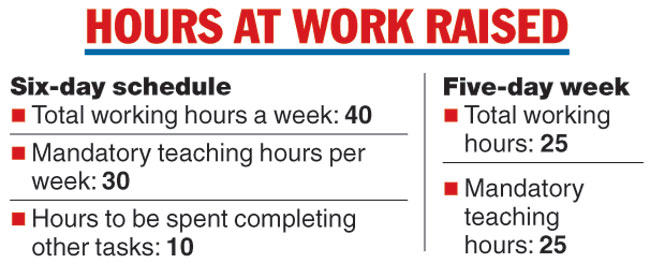Full-time teachers in state-aided colleges would need to work six days a week and devote 30 hours to teaching and another 10 hours to administrative tasks as part of a new resource management strategy based on feedback from principals struggling to meet deadlines.
Government and aided colleges in Bengal follow a five-day week for teachers, which works out to 25 hours of teaching. Most teach for less than 25 hours a week, according to a senior official of the higher education department.
Once the change takes effect, the workload of a full-time teacher is likely to be 40 hours a week. The proposed 10 hours of non-teaching assignments will include admission and examination-related work. The other duties are helping the administration organise seminars and debates and preparing for NAAC and other inspections.
The government initiated the process of increasing teaching hours in colleges after receiving complaints from college heads that they were finding it difficult to complete the BA, BSc and BCom syllabi under the semester and choice-based credit system.
The semester and choice-based credit system was introduced in commerce across colleges in 2017 and in arts and science last year. Under the semester system, students are required to complete six semesters over three years.
“In the erstwhile 1+1+1 system, exams would be held annually and we somehow managed with teachers working four hours a day. But now that exams are held twice a year, we need to ensure that the syllabus earmarked for each semester is completed within the first 90 days,” a principal said.
Officials of the higher education department recently held a series of meetings with college heads to discuss how to quickly switch to a six-day week for teachers.
College teachers have had a five-day working week since 1986, when the University Grants Commission (UGC) asked the states to ensure that they got one day a week for preparatory work outside the campus, including library study and research.
“The job of a teacher involves many activities other than teaching in class. And that is why the universities had adopted the UGC’s suggestion in 1986 that allowed teachers to be outside the campus on a weekday for other academic work,” a teacher said.
But principals facing a shortage of staff to handle academic responsibilities argue that in most cases, the time allowed for “preparation” is not utilised the way it should be.
The government had been planning to raise the number of teaching hours of college teachers since 2013, but failed to implement it because of resistance from both Trinamul and Left-backed unions of college and university teachers.
State-aided colleges are open six days a week and classes are held on Saturdays. “If students, teachers, principals and non-teaching staff can be present on all six days, there is no reason why teachers should have a five-day week,” an education department official said. “The government is planning to adopt the six-day schedule, conforming to the UGC guidelines of 2016 that also stipulate a minimum 30 hours of teaching a week.”

The Telegraph











